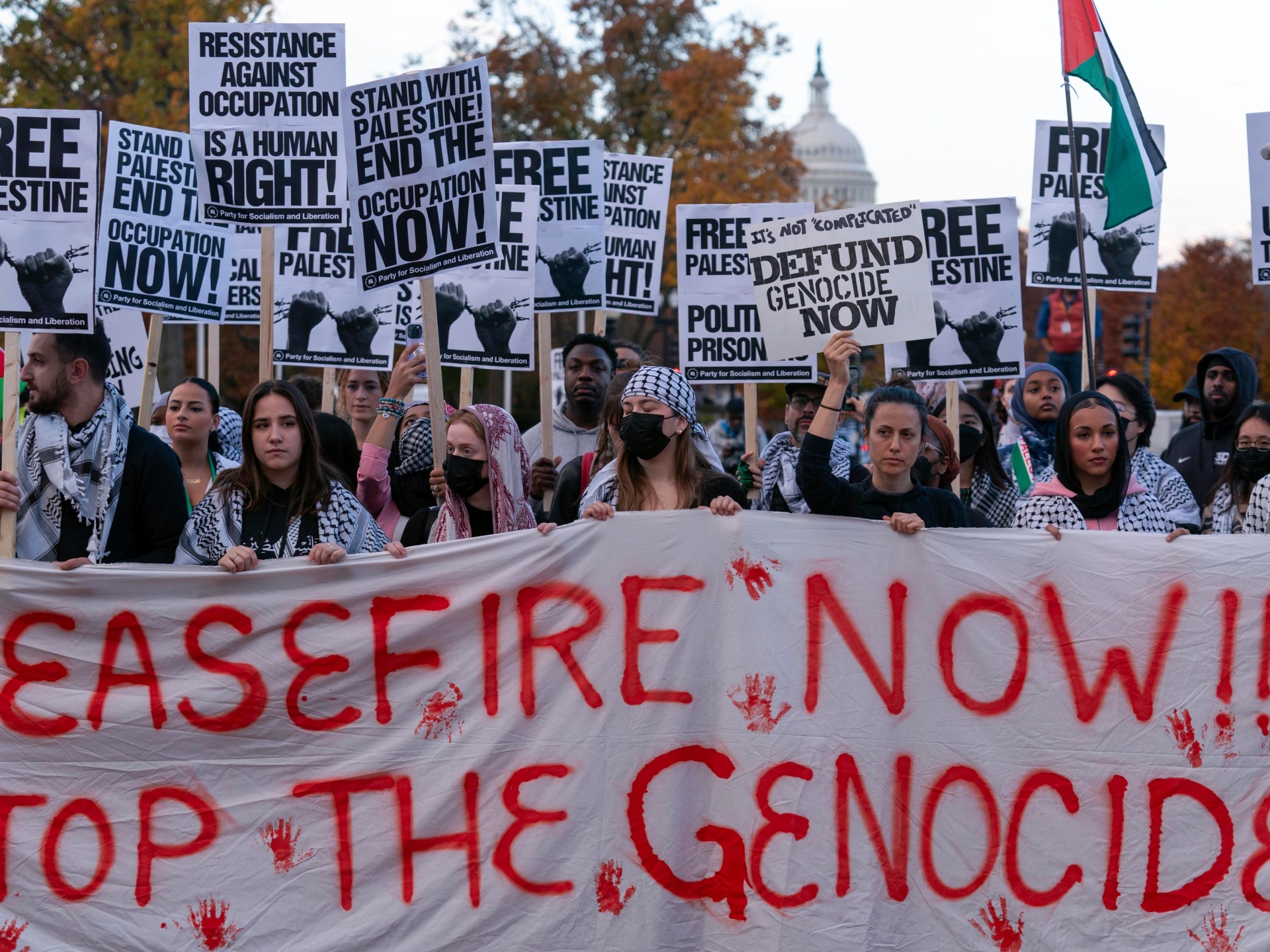
The ongoing explosion in Public Activism in the United States and the world for a ceasefire in Gaza and equal rights for Israelis and Palestinians is as important a battlefield as the military confrontation over Gaza in this centuries-old conflict.
It shows the diminishing effectiveness of traditional pro-Israel propaganda in the face of Israel’s more visible and explicit apartheid policies and widespread, tech-savvy mobilizations of pro-Palestine and justice movements. It also signals how people around the world recognize the suffering of the Palestinians and their fight for national rights is one of the last anti-colonial struggles in the world.
Signs of this trend were already visible before the Hamas attacks on southern Israel on October 7, in which 1,200 people were killed and about 240 captured. But the unprecedented and brutal Israeli counterattack against civilians and all institutions of life in Gaza that followed – 15,000 people killed and the displacement of nearly 80 percent of the population – has highlighted Israeli policy and its long colonial tradition and turned global sentiment against Israel’s aggression.
That public pressure, in turn, forced even war advocates in the West to reluctantly push for a week-long ceasefire and negotiate prisoner exchanges by Israel and Hamas before fighting resumed on Friday.
Perhaps the most compelling of the political developments currently in flux that will shape the world’s view of the war and the shape of the region is the steady stream of students and young professionals in the United States and beyond who are calling for equal rights deploy both Palestinians and Israelis. They have achieved this through global mass actions such as demonstrations, lawsuits, strikes, media campaigns and public expressions of support from athletes, artists and others in society.
Not surprisingly, this has sparked counter-campaigns by pro-Israel groups in the US and around the world to suppress the voices of pro-Palestinian activists and criminalize elements of Palestinian identity itself Showing the Palestinian flag or wearing the Keffiyeh headdress.
Lots of public discussions and Meet on this topic were banned and people who expressed any kind of sympathy for Palestine – even if it was in old social media posts – were fired from their jobs. The greatest cruelty was Israel’s ban on public displays of joy by families and communities for young Palestinian prisoners released from Israeli prisons during the ceasefire – a ban that most Palestinians unsurprisingly ignored.
Many reasons explain why public sentiment in the United States and worldwide has shifted from a traditional, strongly pro-Israel stance to a more balanced stance aimed at ending Israel’s occupation and military cruelty against Palestinians and seeking accountability and reparations for the past to call for a century of Zionist settler-colonial excesses throughout historic Palestine, from Jordan to the Mediterranean. These include in particular the ethnic cleansing and forced exile of the Palestinians, refugee, occupation, statelessness and fragmented nation.
The growing public support for Palestinian rights reflects Israel’s harsh, often criminal policies that are now visible to the world every day – including the brutality in Gaza, which lawyers and academics are increasingly evaluating in the context of genocide.
Partnerships of Palestinian activists with progressive groups around the world have also amplified calls for justice.
This expanded rapidly after the Black Lives Matter movement raised people’s awareness and focused on the demands for social justice that continue to exist among oppressed and colonized people in many countries. People around the world have recognized the connection between history, Zionism, Israel, the Palestinians and the consequences of the US and UK’s total and enthusiastic support of Israel’s actions. Most of the world, which has suffered and remembers the pain and shame of Western colonialism, instinctively recognized the ongoing resistance of the Palestinians against Israel as the world’s last anti-colonial struggle and seeks to support it in every possible way.
Young people and university students are leading this new wave of social justice activism because they see on their cell phones and computer screens the damage being done to the lives of people everywhere by 19th century-style colonial policies, whether against African Americans in Missouri or Palestinians in Gaza or Jeninor ethnic minorities in other countries.
When credible reports from international groups such as Amnesty International or Human Rights Watch describe Israel’s policy of controlling Palestinians as apartheid, the conscience of the world – led by its youth and students – springs into action to free us from this scourge. Equality for Israelis and Palestinians is their goal, as happened in South Africa after decades of nonviolent and occasional military fighting.
Not surprisingly, this global wave of pro-Palestine activism has sparked some wild accusations that the protests – particularly on US campuses – are motivated by anti-Semitism or support for Hamas. This, more than anything else, reflects the desperation of Zionist and pro-Israel groups who recognize and fear that their traditional propaganda in the West is faltering.
Other arguments are made about why the global wave of action for universal social justice and ending settler colonial occupations is insincere. Some say activists unfairly attack Israel but ignore other governments that treat people harshly. Others argue that Israel treats its Palestinian citizens well because some of them sit in parliament, or that Israel is a good place because it respects LGBTQ rights.
Diversionary propaganda like this will increase, but it will fail because it has failed in recent years – because the pain, cruelty and criminality of settler-colonial apartheid is drawing attention and driving the activism of all decent people everywhere, for who want to work for a better world.
While Israel has many impressive qualities in science, education, agriculture and other areas, they are drowned out by the soul-crushing settler-colonial-apartheid reality we see on television every day.
That’s why we march in the streets for social justice and freedom for all, as good people have always done, to remedy the failings of their world and right the wrongs.
The views expressed in this article are the author’s own and do not necessarily reflect the editorial stance of Al Jazeera.






Recent Comments